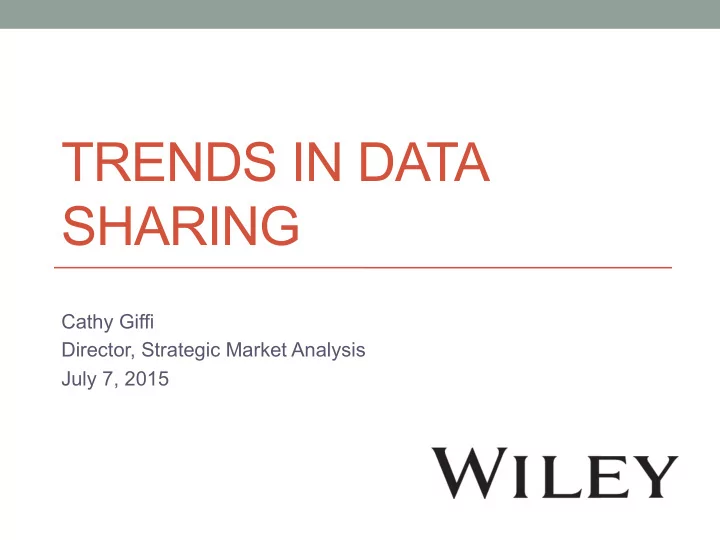

TRENDS IN DATA SHARING Cathy Giffi Director, Strategic Market Analysis July 7, 2015
About Me Catherine (Cathy) Giffi is Director, Strategic Market Analysis, for Wiley. Her team of talented analysts are charged with producing groundbreaking research on issues impacting librarians, societies, and researchers, including Open Access, Researcher Workflow, Data Sharing, Society Member Benefits, and Reviewer Benefits. She holds a Masters degree in Publishing from NYU and, in addition to Wiley, has led large scale research projects for the Sundance Film Festival and VOGUE magazine.
SHARING DATA IS NOTHING NEW.
Data Sharing Is Older Than Wiley
NIH Recognizes Importance of Sharing Accessed April 17, 2015
NSF Mandates Data Management Plans Accessed April 17, 2015
Journal Data Archiving Policy
WILEY RESEARCHER DATA SHARING SURVEY March 2014
Our objective was to establish a Survey baseline view of data sharing Responses By practices, attitudes, and the Numbers motivations globally , with • 90,000 researchers participation from researchers in invited to every scholarly field. participate. • 3,000 responses recorded. • 203 fields of study were recorded. 12% of respondents were from the • 85 countries chemistry community. participated. • 14 days to participate.
Most researchers are sharing their data. Key Findings Data shared is typically <10 GB. The most common type of data that is being shared is flat, tabular data (.csv, .txt, .xl) Data is usually “archived” on hard drives. Those not sharing have a variety of reasons.
Where Did • Supplemental material (67%) You Make Your • At a conference (57%) Data Publicly • Informal paths/by request (42%) Available? • Personal, institutional, or project webpage (37%) • Institutional data repository (26%) Of those surveyed, 66% have made data publicly • Discipline-specific data repository (19%) available (ever). • General purpose data repository, e.g. Dryad, figshare (6%) Within the chemistry community, 68% have • Other (5%) made data publicly available. Chemists are less likely to share via an institutional data repository (23%), discipline-specific repository (16%), or via informal request (email, direct communication), and more likely to present snapshots of data at conferences (70%) and via supplemental material (73%).
Why Researchers Do Not Share Data IP or confidentiality issues (83%) The chemistry community followed the Research might be “scooped” (70%) same general trend as the larger pool of respondents. Concerns about misinterpretation (32%) Insufficient time/resources (32%) No mandate from Funder/Institution (13%) Unsure how, where to share (8%)
Variation by Field of Research Life Science* Health Science • Concerns that their • Intellectual property or research will be confidentiality issues scooped (56%) (68%) • Intellectual property or • Ethical concerns (36%) confidentiality issues • Concerns about (54%) misinterpretation or • Concerns about misuse (36%) misinterpretation or misuse (43%) *Most likely to share data
Variation by Field of Research Physical Science Social Science & Humanities* • Intellectual property or • Intellectual property or confidentiality issues confidentiality issues (47%) (47%) • No funder or institutional • Concerns about being require (29%) scooped (30%) • Concerns that their • No funder or institutional research will be scooped requirement (28%) (27%) *Least likely to share data
Variation by Country
DATA SHARING March 2014 to Present
Echoes of Our Findings “[Researchers] cite lack of time , money and universally agreed upon standards , as well as technical barriers , as the main reasons they hold data back. Of course, there are psychological and cultural reasons, too: a sense of ownership over such a hard-won resource and a fear of scrutiny and of being “scooped. ” Neurodata Without Borders August 2014
Echoes of Our Findings “Twenty potential barriers were identified and classified in six categories: Technical , Motivational , Economic , Political , Legal , Ethical .” BMC Public Health November 2014
Wiley Partnership With Figshare Ø To support authors who wish to openly share their data, Wiley have embarked on a partnership with Figshare to integrate data sharing within existing journal workflows and article publication. Ø The new service is being piloted with a limited number of titles and will be rolled out over the new few months along with new data citation and data sharing policies. Ø The net result will be that more data will be able to be accessed, shared and reproduced without cost as a consequence of authors publishing articles with Wiley.
• Sharing data is crucial for the advancement of science. T akeaways • Recognizing the barriers to sharing is important. • Some barriers can be more easily overcome. • Others will take the support of the scholarly community.
To Share or Not to Share, That is the Research Data Question For More Scholarly Kitchen Information How and Why Researchers Share Data, and Why Cathy Giffi They Don’t Director, Strategic Market Analysis, Wiley Exchanges cgiffi@wiley.com
THANKS!
Recommend
More recommend